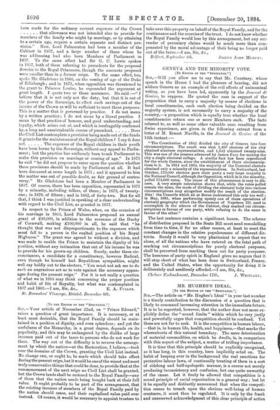GENEVA AND THE MINORITY VOTE.
[To EDITOR OF THE "SPECTATOR."] STR,—Will you allow me to say that Mr. Courtney, whose
speech in the House I had the pleasure of hearing, did not adduce Geneva as an example of the evil effects of uninominal voting, as you have been led, apparently by the Journal de Geneve, to suppose. He quoted the case in support of the proposition that to carry a majority by means of elections in local constituencies, each such election being decided on the majority system, is not necessarily to carry a majority of the country,—a proposition which is equally true whether the local constituencies return one or more Members each. The facts referred to, as well as some other valuable ones resulting from Swiss experience, are given in the following extract from a letter of M. Ernest Naville, in the Journal de Geneve of the 12th instant :—
" The Constitution of 1842 divided the city of Geneva into four circumscriptions. The result was that 1,409 electors of the city obtained nineteen representatives, and 1,342 obtained twenty-nine. This was one of the reasons advanced by James Fazy for making the city a single electoral college. A similar fact has been reproduced for the whole Canton, since the establishment of three circumscrip- tions in it. In 1854 and 1864, the majority of the Cantonal electors obtained only a minority of the representatives. In Switzerland, last October, 170,000 electors gave their party a very large majority in the National Council, although the Opposition, which is in the minority, polled 174,000 votes. The cause of this phenomenon is easy to dis- cern. A very simple calculation shows that while the votes polled remain the same, the mode of dividing the electoral body into various circumscriptions may altogether modify the result of the election. Alas ! the Councils which sit at Berne understood this only too well ; in May, 1881, when performing openly one of those operations of electoral geography which the Government of Napoleon III. used to accomplish in the silence of the Cabinet, they marked out circum- scriptions in favour of one party, while refusing to do the same in favour of the other."
The last sentence contains a significant lesson. The scheme of distribution proposed in the Seats Bill must need remodelling from time to time, if for no other reason, at least to meet the constant changes in the relative populousness of different dis- tricts. Surely it would be very pharisaical to expect that we alone, of all the nations who have entered on the fatal path of marking out circumscriptions for purely electoral purposes, shall be preserved from marking them out for party purposes.
The keenness of party spirit in England gives no augurs that it will stop short of what has been done in Switzerland, France, and the United States, when the opportunity for doing it is deliberately and needlessly afforded.—I am, Sir, &e.,
Chelsea Embankment, December 17t1. J. WESTLAKE.






































 Previous page
Previous page